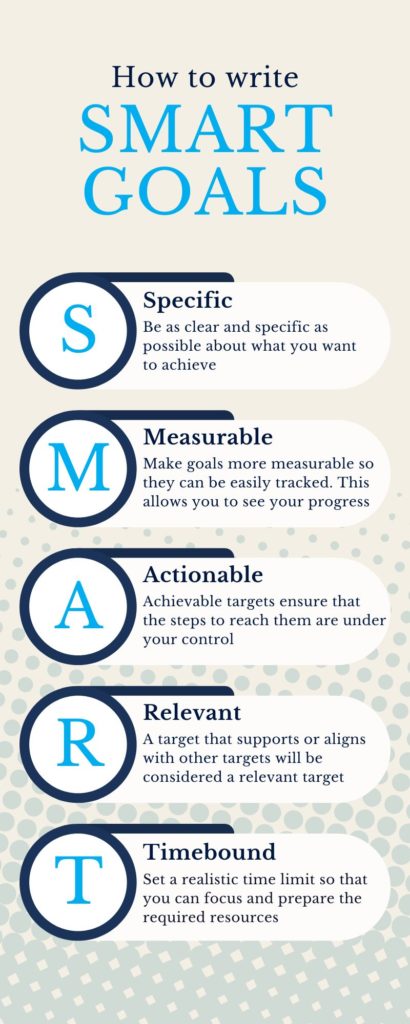When you engage in a discussion with your mentor, a significant focus will be placed on establishing SMART goals. These goals serve as a well-defined pathway to help you achieve your desired outcomes, enabling you to effectively manage your time and allocate resources for progress. Without clear goals in place, it becomes challenging to objectively evaluate the effectiveness of the tasks or projects you undertake.
To set your goals, you will need to ask yourself the below questions, with the answers helping to frame objectives for the mentorship.
- What are you hoping to achieve from the mentorship?
- What areas of your development do you need support with?
- What are the main obstacles / roadblocks to your desired goals?
- Where do you see yourself in 5 years?
- What are you already doing to move towards achieving your goals?
- What have you already tried and tested within your career plan?
The more understanding you have of your own goals and motivations, the more specific you will be in defining what you want to accomplish via a mentoring relationship. The greater detail around your goals, the more effective your mentor will be able to help you to succeed.
Types of goals
Habit forming goals
Goals that you would like to see become habitual behaviours. It takes between 21-60 days to form a habit; set the goal at between 4-8 weeks
Reach goals
Goals that require a few steps to ‘reach’ and therefore are short to medium term goals (3-12 months to achieve)
Stretch goals
Goals that are aspirations and require significant work to achieve. For this reason, they are long term goals and may take 1-5 years to achieve.
What are SMART goals?

Setting SMART goals allows your mentor to be more effective throughout the mentorship relationship. Here are some ideas to get you started:
SMART goal setting examples
Specific: I will develop my technical product skills by attending the Product Focus training course
Measurable: I will present my ideas to 3 senior product stakeholders within the business
Actionable: I will expand my product management network by attending 2 networking events by the end of the year
Relevant: To understand my people management style, I will ask key stakeholders to take part in 360 degree / peer-to-peer feedback
Timebound: I want to be promoted to Head of Product within my existing company in the next 6 months
SMART goals: a full example
Objective: I want to be promoted to from Senior Product Manager to Head of Product within my existing company, in the next 6 months by delivering against my existing product roadmap.
How is this a SMART goal?
Specific: This goal is specific because it focuses on gaining a specific Head of Product job role
Measurable: Success can be measured by whether each task on the product roadmap was delivered successfully on-time, and whether the promotion was received at the 6-month mark.
Achievable: The goal set is achievable as the goal setter already has the skills and knowledge as a Senior Product Manager within the business.
Relevant: The goal is relevant as it requires product roadmap work to be successfully completed before applying for the promotion.
Timebound: A deadline has been clearly set for 6 months’ time
Additional ideas for goal setting:
- Build self confidence and ability to present to the wider, cross functional team
- Expand my network of contacts within product management
- Develop a reputation as an advisor and guide for others within my team
- Strengthening communication skills within cross functional team
- Strengthen influencing skills to effect team strategy
- Develop my technical skills as a product manager / product leader
- Understand my people management style
- Become a SAAS industry expert
- Overcoming time management and prioritisation challenges within my role
- Be promoted into a senior product leadership position
- Transition my company into a product led organisation
- Influence senior stakeholders in the business to my way of thinking
Summary
Use our goal setting template to record your SMART goals and share this with your mentor. These goals should be referred to each month as part of your mentorship meetings, to make sure you are progressing to your targets. You may also want to ask your mentor for feedback using our recommended start, stop, continue model, so you can build any constructive feedback into your goal plan.




